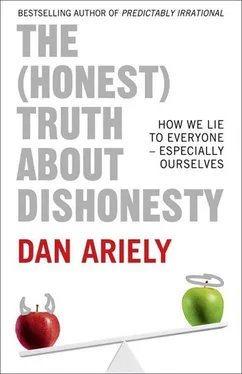Ariely, Dan - The (Honest) Truth About Dishonesty - How We Lie to Everyone – Especially Ourselves
Здесь есть возможность читать онлайн «Ariely, Dan - The (Honest) Truth About Dishonesty - How We Lie to Everyone – Especially Ourselves» весь текст электронной книги совершенно бесплатно (целиком полную версию без сокращений). В некоторых случаях можно слушать аудио, скачать через торрент в формате fb2 и присутствует краткое содержание. Жанр: Старинная литература, на английском языке. Описание произведения, (предисловие) а так же отзывы посетителей доступны на портале библиотеки ЛибКат.
- Название:The (Honest) Truth About Dishonesty: How We Lie to Everyone – Especially Ourselves
- Автор:
- Жанр:
- Год:неизвестен
- ISBN:нет данных
- Рейтинг книги:4 / 5. Голосов: 1
-
Избранное:Добавить в избранное
- Отзывы:
-
Ваша оценка:
- 80
- 1
- 2
- 3
- 4
- 5
The (Honest) Truth About Dishonesty: How We Lie to Everyone – Especially Ourselves: краткое содержание, описание и аннотация
Предлагаем к чтению аннотацию, описание, краткое содержание или предисловие (зависит от того, что написал сам автор книги «The (Honest) Truth About Dishonesty: How We Lie to Everyone – Especially Ourselves»). Если вы не нашли необходимую информацию о книге — напишите в комментариях, мы постараемся отыскать её.
The (Honest) Truth About Dishonesty: How We Lie to Everyone – Especially Ourselves — читать онлайн бесплатно полную книгу (весь текст) целиком
Ниже представлен текст книги, разбитый по страницам. Система сохранения места последней прочитанной страницы, позволяет с удобством читать онлайн бесплатно книгу «The (Honest) Truth About Dishonesty: How We Lie to Everyone – Especially Ourselves», без необходимости каждый раз заново искать на чём Вы остановились. Поставьте закладку, и сможете в любой момент перейти на страницу, на которой закончили чтение.
Интервал:
Закладка:
Imagine that you are taking part in an experiment similar to the previous one. You took the eight-question quiz and answered four questions correctly (50 percent), but thanks to the answers at the bottom of the page, you claimed that you had solved six correctly (75 percent). Now, do you think that your actual ability is in the 50 percent range, or do you think it is in the 75 percent range? On the one hand, you may be aware that you used the answer key to inflate your score, and realize that your real ability is closer to the 50 percent mark. On the other hand, knowing that you were paid as if you really had solved six problems, you might be able to convince yourself that your ability to solve such questions is in reality closer to the 75 percent level.
This is where phase two of the experiment comes in. After finishing the math quiz, the experimenter asks you to predict how well you will do on the next test, in which you will be asked to answer a hundred questions of a similar nature. This time, it’s clear that there are not going to be any answers at the bottom of the page (and therefore no chance to consult the key). What do you predict your performance will be on the next quiz? Will it be based on your real ability in the first phase (50 percent), or will it be based on your exaggerated ability (75 percent)? Here is the logic: if you are aware that you used the answer key in the previous test to artificially inflate your score, you would predict that you would correctly solve the same proportion of questions as you solved unassisted in the first test (four out of eight, or around 50 percent). But let’s say you started believing that you really did answer six questions correctly on your own and not because you looked at the answers. Now you might predict that in this next test, too, you would correctly solve a much larger percentage of the questions (closer to 75 percent). In truth, of course, you can solve only about half of the questions correctly, but your self-deception may puff you up, crablike, and increase your confidence in your ability.
The results showed that participants experienced the latter sort of self-puffery. The predictions of how well they would perform on the second phase of the test showed that participants not only used the answer key in the first phase to exaggerate their score, but had very quickly convinced themselves that they truly earned that score. Basically, those who had a chance to check their answers in the first phase (and cheated) started believing that their exaggerated performance was a reflection of their true skill.
But what would happen if we paid participants to predict their score accurately in the second phase? With money on the line, maybe our participants wouldn’t so patently ignore the fact that in phase one they had used the answer key to improve their scores. To that end, we repeated the same experiment with a new group of participants, this time offering them up to $20 if they correctly predicted their performance on the second test. Even with a financial incentive to be accurate, they still tended to take full credit for their scores and overestimate their abilities. Despite having a strong motivation to be accurate, self-deception ruled the day.
I KNEW IT ALL ALONG
I give a considerable number of lectures about my research to different groups, from academics to industry types. When I started giving talks, I would often describe an experiment, the results, and finally what I thought we could learn from it. But I often found that some people were rather unsurprised by the results and were eager to tell me so. I found this puzzling because, as the person who actually carried out the research, I’d often been surprised by the outcomes myself. I wondered, were the people in the audience really that insightful? How did they know the results sooner than I did? Or was it just an ex post facto feeling of intuition?
Eventually I discovered a way to combat this “I knew it all along” feeling. I started asking the audience to predict the results of the experiments. After I finished describing the setup and what we measured, I gave them a few seconds to think about it. Then I would ask them to vote on the outcome or write their prediction down. Only once they committed to their answer would I provide the results. The good news is that this approach works. Using this ask-first method, I rarely receive the “I knew it all along” response.
In honor of our natural tendency to convince ourselves that we knew the right answers all along, I call my research center at Duke University “The Center for Advanced Hindsight.”
Our Love of Exaggeration
Once upon a time—back in the early 1990s—the acclaimed movie director Stanley Kubrick began hearing stories through his assistant about a man who was pretending to be him. The man-who-would-be-Kubrick (whose real name was Alan Conway and who looked nothing like the dark-bearded director) went around London telling people who he famously was(n’t). Since the real Stanley Kubrick was a very private person who shunned the paparazzi, not many people had any idea of what he looked like. So a lot of gullible people, thrilled to “know” the famous director personally, eagerly took Conway’s bait. Warner Bros., which financed and distributed Kubrick’s films, began calling Kubrick’s office practically every day with new complaints from people who could not understand why “Stanley” would not get back to them. After all, they had treated him to drinks and dinner and paid for his cab, and he had promised them a part in his next film!
One day, Frank Rich (the former theater critic and op-ed columnist of The New York Times ) was having dinner in a London restaurant with his wife and another couple. As it happened, the Kubrick imitator was sitting at a nearby table with a knighted MP and a few other young men, regaling them with stories of his moviemaking marvels. When the imposter saw Rich at the next table, he walked over to him and told the critic that he was inclined to sue the Times for having called him “creatively dormant.” Rich, excited to meet the reclusive “Kubrick,” asked for an interview. Conway told Rich to call him, gave Rich his home phone number, and … disappeared.
Very shortly after this encounter, things began to unravel for Conway as it dawned on Rich and others that they’d been conned. Eventually the truth came out when Conway began selling his story to journalists. He claimed to be a recovering victim of a mental disorder (“It was uncanny. Kubrick just took me over. I really did believe I was him!”). In the end Conway died a penniless alcoholic, just four months before Kubrick. *
Although this story is rather extreme, Conway may well have believed that he was Kubrick when he was parading around in disguise, which raises the question of whether some of us are more prone to believe our own fibs than others. To examine this possibility, we set up an experiment that repeated the basic self-deception task, but this time we also measured participants’ general tendency to turn a blind eye to their own failures. To measure this tendency, we asked participants to agree or disagree with a few statements, such as “My first impressions of people are usually right” and “I never cover up my mistakes.” We wanted to see whether people who answered “yes” to more of these questions also had a higher tendency for self-deception in our experiment.
Just as before, we saw that those in the answer-key condition cheated and got higher scores. Again, they predicted that they would correctly answer more questions in the following test. And once more, they lost money because they exaggerated their scores and overpredicted their ability. And what about those who answered “yes” to more of the statements about their own propensities? There were many of them, and they were the ones who predicted that they would do best on our second-phase test.
Читать дальшеИнтервал:
Закладка:
Похожие книги на «The (Honest) Truth About Dishonesty: How We Lie to Everyone – Especially Ourselves»
Представляем Вашему вниманию похожие книги на «The (Honest) Truth About Dishonesty: How We Lie to Everyone – Especially Ourselves» списком для выбора. Мы отобрали схожую по названию и смыслу литературу в надежде предоставить читателям больше вариантов отыскать новые, интересные, ещё непрочитанные произведения.
Обсуждение, отзывы о книге «The (Honest) Truth About Dishonesty: How We Lie to Everyone – Especially Ourselves» и просто собственные мнения читателей. Оставьте ваши комментарии, напишите, что Вы думаете о произведении, его смысле или главных героях. Укажите что конкретно понравилось, а что нет, и почему Вы так считаете.












